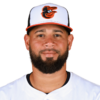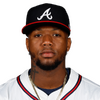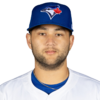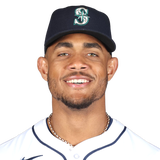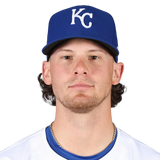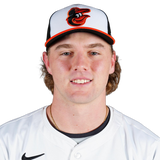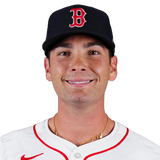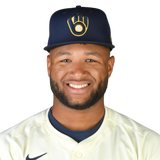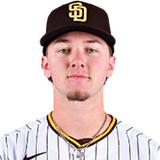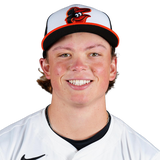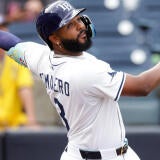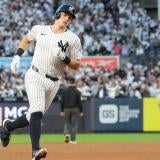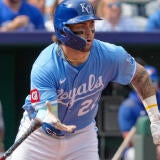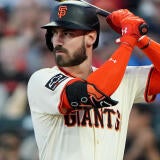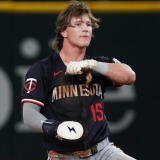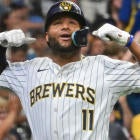Fantasy Baseball: Rookie hitters are taking forever to pay off, and it's been going on longer than you think
Unless you have the patience of a saint, you may want to forgo them entirely

How many of you were excited to draft Wyatt Langford, Jackson Chourio, or Jackson Holliday this year? What about Jordan Walker, Anthony Volpe, or Miguel Vargas last year?
You'd think we'd learn one of these years, and I most certainly include myself when I say "we." Sort of have to given that I've been one of the people leading the push to draft rookies earlier.
And for that, I'm sorry.
It's not due to any failure of memory. Just the opposite, in fact. I remember all too well a time when rookie hitters commonly delivered on the full extent of their potential right away. They weren't necessarily expected to -- weren't even drafted, in many cases -- and that chasm between cost and benefit regularly made them league-winners.
I'm thinking of Kris Bryant, Francisco Lindor, Carlos Correa, and Miguel Sano in 2015:
| 2015 AVG | 2015 HR | 2015 OPS | 2015 AB | |
|---|---|---|---|---|
Kris Bryant
COL DH
| .275 | 26 | .858 | 559 |
Francisco Lindor
NYM SS
| .313 | 12 | .835 | 390 |
Carlos Correa
MIN SS
| .279 | 22 | .857 | 387 |
Miguel Sano
LAA 3B
| .269 | 18 | .916 | 279 |
Corey Seager, Trevor Story, Trea Turner, and Gary Sanchez helped to transform what were then weak positions in 2016:
| 2016 AVG | 2016 HR | 2016 OPS | 2016 AB | |
|---|---|---|---|---|
Corey Seager
TEX SS
| .308 | 26 | .877 | 627 |
Trevor Story
BOS SS
| .272 | 27 | .909 | 372 |
Trea Turner
PHI SS
| .342 | 13 | .937 | 307 |
Gary Sanchez
MIL DH
| .299 | 20 | 1.032 | 201 |
Then came Aaron Judge, Cody Bellinger, Matt Olson, and Rhys Hoskins in 2017:
| 2017 AVG | 2017 HR | 2017 OPS | 2017 AB | |
|---|---|---|---|---|
Aaron Judge
NYY CF
| .284 | 52 | 1.049 | 542 |
Cody Bellinger
CHC CF
| .267 | 39 | .933 | 480 |
Matt Olson
ATL 1B
| .259 | 24 | 1.003 | 189 |
Rhys Hoskins
MIL 1B
| .259 | 18 | 1.014 | 170 |
Followed by one of the most memorable rookie classes ever -- Ronald Acuna, Juan Soto, Shohei Ohtani, and, sure, let's throw in Gleyber Torres -- in 2018:
| 2018 AVG | 2018 HR | 2018 OPS | 2018 AB | |
|---|---|---|---|---|
Ronald Acuna
ATL RF
| .293 | 26 | .917 | 433 |
Juan Soto
NYY RF
| .292 | 22 | .923 | 414 |
Shohei Ohtani
LAD DH
| .285 | 22 | .925 | 326 |
Gleyber Torres
NYY 2B
| .271 | 24 | .820 | 431 |
But it was probably 2019 when the idea of the miracle rookie became so firmly implanted in my mind that it would several lumps to dislodge it. Highlights include Pete Alonso, Fernando Tatis, Yordan Alvarez and Bo Bichette:
| 2019 AVG | 2019 HR | 2019 OPS | 2019 AB | |
|---|---|---|---|---|
Pete Alonso
NYM 1B
| .260 | 53 | .941 | 597 |
Fernando Tatis
SD RF
| .317 | 22 | .969 | 334 |
Yordan Alvarez
HOU DH
| .313 | 27 | 1.067 | 313 |
Bo Bichette
TOR SS
| .311 | 11 | .930 | 196 |
That's only scratching the surface, too. Eloy Jimenez, the second highest-drafted rookie hitter that year at 117th overall (according to FantasyPros), was considered something of a disappointment even though he hit .267 with 31 homers and an .828 OPS.
For each of those five years, in fact, I highlighted only a small sample of the high-impact rookies. Others during that span include Kyle Schwarber, Alex Bregman, Rafael Devers, Ian Happ, Bryan Reynolds, Will Smith, and Brandon Lowe. You can look up the numbers for yourself.
The 2020 season marked a turning point. That's when we went from having 12-18 rookies with an .800 OPS or better to more like 6-12. So yes, there have been successes, but the rookie seasons put together by Jazz Chisholm, Bobby Witt, Adley Rutschman, Triston Casas and Gunnar Henderson were nothing like the ones highlighted above. (Julio Rodriguez and Corbin Carroll came a little bit closer, and I'll have more to say about them in a bit.)
You might say I'm cherry-picking, highlighting only the examples that best make my case, and to that, I say ... yeah, obviously. I can't deny there were some hitting prospects who fell short of expectations during that 2015-2019 span, with Vladimir Guerrero being one prominent example.
But if you prefer to examine the numbers on a macro level, you'll arrive at the same conclusion. The table below depicts league-wide OPS for both rookies and batters in general over the past 10 years. Because offense as a whole has risen and fallen during that time, you'll want to pay particular attention to the "difference" column:
| | All batters | Rookies | Difference |
2015 | .721 | .729 | -.008 |
2016 | .739 | .730 | .009 |
2017 | .750 | .734 | .016 |
2018 | .728 | .714 | .014 |
2019 | .758 | .736 | .022 |
2020 | .740 | .682 | .058 |
2021 | .728 | .689 | .039 |
2022 | .706 | .672 | .034 |
2023 | .734 | .701 | .033 |
2024 | .714 | .668 | .046 |
There was essentially no difference between rookies and all other hitters from 2015 through 2019, and now, the difference is stark. The rookie hitters are worse.
If that seems like a too-obvious conclusion to you, fair enough. For most of baseball history, it was indeed obvious. But for the most significant portion of my Fantasy Baseball-playing years -- and I suspect some of yours as well -- it wasn't so much the case. And we became spoiled, trusting every prospect with a job to serve as our own little cheat code.
With that expectation, the price went up. What once was only a handful of prospects being drafted soon became a multitude, with many being pushed into the middle and early rounds. It was around this time that a new CBA came out, offering draft pick incentives for teams that awarded their nearest-term prospects an opening day job -- a policy that seemed like a win for Fantasy Baseballers, but it only further inflated the cost of those prospects. At least before, we had to safeguard against the likelihood of them being held back for weeks or even months.
To sum it all up, we're paying more for prospects and expecting more as well, but we're only getting less -- much less. It's been going on for several years now, so again, you'd think we'd learn.
Well, I have, as evidenced by the several hundred words you just read. Now here's what I intend to do about it ...
I'm not paying a premium for prospects anymore, at least not hitters. It doesn't matter if they have a huge spring training (see Wyatt Langford this year or Anthony Volpe last year). It doesn't matter if the scouting reports all make them out to be the most perfect baseball specimen ever to grace the planet. My expectation should be that they'll fail. That was my approach during my earliest years writing about Fantasy Baseball, and it served me well then. It was only during that 2015-2019 period (and perhaps a little before) that I became conditioned to think otherwise.
Wait a minute, Scotty boy, aren't you taking this a little far? What about all those hitters who go on to win Rookie of the Year?
Hey, somebody has to. And none of this is meant to suggest that today's rookie hitters won't develop into tomorrow's studs. Somebody has to do that as well. But it's not happening instantaneously, and we draft them with the expectation that it will.
But what about Corbin Carroll last year?
No doubt, Carroll was great from start to finish, and those of us who paid a fourth- or fifth-round price for him were rewarded with first-round production. There are exceptions to every rule, of course, but if you mistake the exception for the rule, you'll continue to operate under false premises. Carroll's big rookie season brought me a world of hurt this year, leading me to believe that my growing antipathy toward rookie hitters was ill-founded. I've since come to believe that we simply got lucky with him last year. Things could have gone more like ... well, about like they have during this, his sophomore season.
But what about Julio Rodriguez the year before?
Interesting that you bring him up. Rodriguez has developed a reputation for being a painfully slow starter, and it began with his rookie season. Back in 2022, the then-21-year-old hit .268 with six home runs and a .737 OPS over the first two months. He then went on to hit .293 with 22 home runs and a .918 OPS over the next four.
Rodriguez's sophomore season played out similarly, and thus the trajectory of his rookie season was classified as a personal flaw rather than part of a broader trend. The truth is that many of the successful rookie seasons from the past few years have had a similar trajectory -- i.e., an unremarkable first two months followed by a dramatic awakening.
In addition to Rodriguez, there was Bobby Witt in 2022:
| ||||||||||||
| ||||||||||||
Then came Gunnar Henderson and Triston Casas in 2023:
| ||||||||||||
| ||||||||||||
This year, there's the Jackson Three: Jackson Chourio, Jackson Merrill, and Jackson Holliday.
| ||||||||||||
| ||||||||||||
| ||||||||||||
Perhaps it's unfair to include Holliday given the tiny sample, but the contrast is stark. His start to the season was so bad that he got sent back to the minors for several months, but he's returned looking like the world-beater we hoped he'd be.
You see there? Rookie hitters are worth it after all!
That's not my takeaway. Again, we're drafting these guys to be a prominent part of our Fantasy team from the beginning, and they're not. Perhaps it's predictable that they'll eventually round into form, or perhaps not, but in either case, we're not prepared for an eventuality. By the time it becomes a reality, we're either in such a deep hole that we hardly care anymore or, in the case of shallower leagues with ample waiver wire alternatives, we've already moved on. Someone else is enjoying the production we paid for.
So why not just be patient?
Because, man, the cost! Why not just draft a hitter we can trust from the get-go? That's what I mean when I say I'm not paying a premium for prospects anymore (at least not hitters). I'm not saying I'll never draft one, but again, my expectation should be that he'll fail, by which I mean the cost should be such that I won't care if he does. As a late-round flier, sure. That's how I landed Aaron Judge in Tout Wars back in 2017, and it nearly won me the league. But I drafted him to fill a bench spot, not to be an integral part of my lineup. The cost has to be low, and the frequency should be limited. That second point is especially true in deeper leagues when too many failed lottery tickets make for a roster riddled with holes.
And just because you don't draft them doesn't mean you can't benefit from them. Better to be the one acquiring them for nickels on the dollar after a rough first couple months -- or perhaps even scooping them up off the waiver wire.








